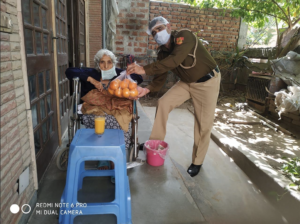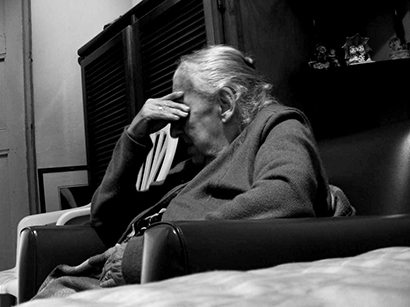Amid the nation-wide lockdown, senior citizens living alone are finding it hard to manage their day-to-day activities
When the Prime Minister announced a nation-wide lockdown on 22 March to keep Covid-19 from spreading, people were given only four hours time to stock up for the next 21 days. This left many senior citizens in a quandary as they are also the demographic that has been specifically warned to stay indoors as the virus can have a more lethal effect on them.
The Ministry of Health and Family Welfare (MOHFW) released an advisory especially for the elderly population on the do’s and don’ts during the Covid-19 pandemic. It includes the usual directions to stay at home, wash hands and also reminds them to take their medication on time, and stay in touch with friends and family over voice and video calls.
A paper published in The Lancet, ‘Estimates of the severity of coronavirus disease 2019: a model-based analysis’ says that the virus kills an estimated 13.4% of patients 80 and older, compared to 1.25% of those in their 50s and 0.3% of those in their 40s.’
The sharpest divide came at age 70. Although 4% of patients in their 60s died, more than twice that, or 8.6%, of those in their 70s did.
They the medical journal did by collecting individual-case data for patients who died from Covid-19 in Hubei, mainland China (reported by national and provincial health commissions until 8 February), and for cases outside of Mainland China (from government or ministry of health websites and media reports for 37 countries, as well as Hong Kong and Macau, until Feb 25, 2020). This individual-case data was used to estimate the time between onset of symptoms and outcome (death or discharge from hospital).
Progeny of the elderly have been expressing concern for their safety, with several posts on Twitter about the distress they themselves are facing living away from their parents, asking the government and the police for help, even while some elderly persons themselves have posted online seeking help.
One elderly person tagged the Prime Minister’s Twitter handle on March 25, asking for help to buy medicines as he and his wife are both above 70 and were unable to leave their home in Delhi’s Dwarka due to the lockdown and “e-services are not allowed to enter” he explained. In fact, Medlife CEO Ananth Narayan accused the Delhi and Bangalore Police of violence against delivery persons despite a pass.
Even though essential services have been allowed to function and some e-commerce sites given passes to function, the lack of coordination saw a major strain for the residents as well as the delivery personnel. Since then, things have gotten better.

Now Delhi Police has been posting videos on Twitter which shows them visiting the elderly, checking their wellbeing, handing them masks — and in some cases groceries. Like the one that ANI news agency was called to document – police personnel helping a 73-year-old senior citizen living in Saidulajab area who had nothing left to eat and no money on her to purchase food.
There will be several others needing help. The Delhi Police has a total of 39,188 senior citizens registered with them as of March 15. DCP Crime Record Office, Rajan Bhagat says they intend on checking up on each of those registered at least over the phone, a process which began a day after the lockdown was announced. “When we came to know that this will be a lockdown for so long, we knew that senior citizens who are by themselves would require our help.”
So, they started contacting the elderly through the senior citizens’ cell headquarters, which according to DCP Bhagat has been strengthened to make calls and ensure the seniors welfare, “We haven’t called all of them yet but it’s an ongoing process. We want to finish at least one round”. There is however a lot of traffic from incoming calls, he says, with many senior citizens seeking help from the police themselves.
“There were some who did not have food so we tied up with certain NGOs to see how they can receive their ration. There were others whose ration was getting over so we helped them get more. Even for medicines we tied up with chemists to help them. We are trying our best to help as much as we can. There are also seniors who are directly in touch with the beat constable and receive help directly by calling the personnel.”
With senior citizens living by themselves or couples who live by themselves depending on a security net such as the police, DCP Bhagat says they try and visit as often as possible, “Our mandate is that one beat constable visit them at least once in 15 days, as instruction is once in a fortnight but practically on ground sometimes we are unable to”. So, phone calls are a safer bet now perhaps to get in touch with those who would need their help especially when the higher threat to life from Covid-19 is to the elderly.
There are also many old age homes which are taking extra precaution to check the safety of its residents. The Earth Saviours Foundation which has its premises for the elderly in Gurgaon, with over 500 residents from both Delhi and Gurgaon has now stopped taking any more people in. Its Additional Director Rani Dutta says this is to ensure that its residents are not put in any danger by someone new.
“Right now, we are not accepting any people due to the pandemic but people still approach us”, and while they stopped accepting new residents they had to make an exception when an elderly man was brought to them last week. “The man was found by himself and someone brought him over to us, we could not just leave him on the street. He appeared to be disoriented and could not tell us where he was from. So, we took him to the hospital, got his checkup done and then brought him to our centre”.
At the centre, the elderly man was kept in isolation but let go the next day. “He didn’t want our help and said he remembered where he came from.”
For the residents still with them, they ensure that the temperature of staff is checked every day and they are given gloves to wear. Sanitisers kept in many places for their use.





